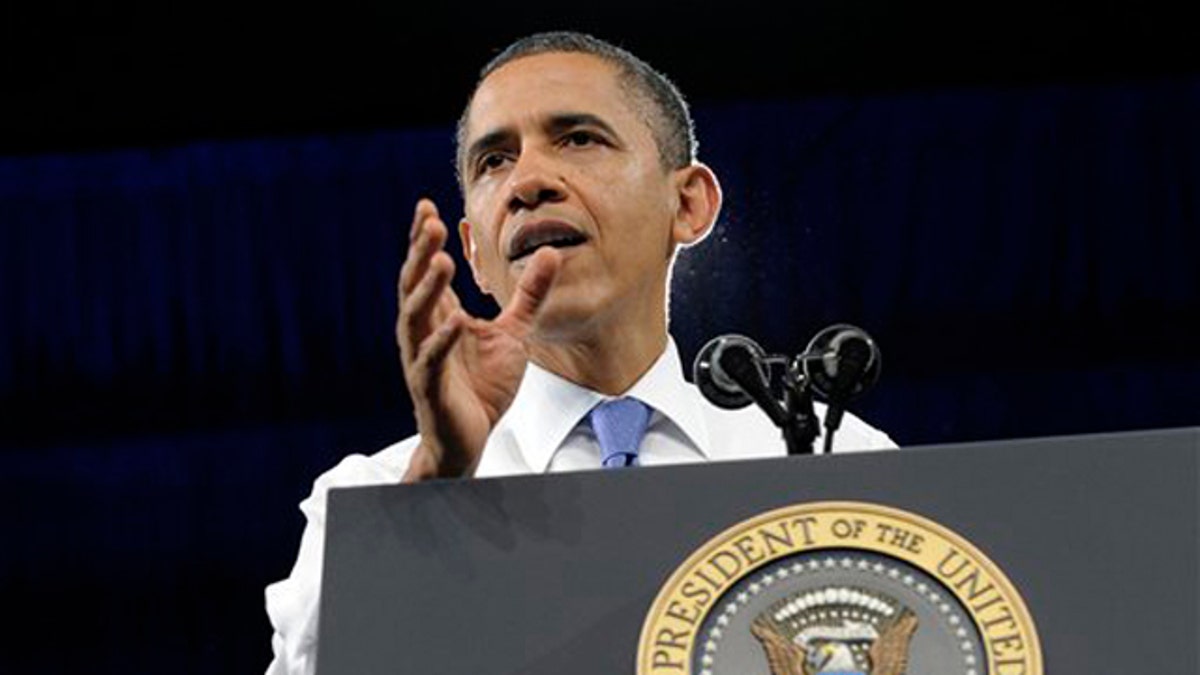
Feb. 23, 2012: President Obama speaks at the University of Miami Field House in Coral Gables, Fla. (AP)
The Obama administration, reeling from the biggest classified information breach in U.S. history thanks to WikiLeaks and its conspirators, is cracking down on intelligence leaks with unprecedented vigor.
But open government groups and watchdogs are raising alarm, claiming the administration is taking a heavy-handed approach that could "chill" whistle-blowers and those who cover their claims.
The groups are not necessarily leaping to the defense of Bradley Manning, the accused WikiLeaker. Rather, they're concerned about the sheer number of Americans who have been charged under the Espionage Act over the past few years.
Since 2009, six Americans accused of leaking sensitive information -- including Manning -- have been charged under the act. The act has been used to charge accused media leakers more times in the last few years than during the rest of the law's decades-long history, according to the Project on Government Oversight.
"They're using a hammer to go after these folks," said Joe Newman, spokesman with the Project on Government Oversight.
The concern is that, while the defendants in these cases may or may not have leaked classified material, the government is using an intimidating tool to punish them. The World War I-era Espionage Act was famously used to charge the Rosenbergs, American communists, for allegedly passing secret information to the Soviet Union -- they were executed for the offense.
Watchdog groups claim being charged under the act is tantamount to being branded a "traitor."
The Justice Department rejects this argument, noting that the act has many provisions -- notably, disclosure of classified information and of defense information, which is not by itself an espionage charge.
"None of these individuals has been charged with spying for a foreign government," Justice Department spokesman Dean Boyd said.
But Ed MacMahon, the defense attorney for a former CIA agent who was indicted and accused of illegally disclosing sensitive information in late 2010, said he thinks the government is using the act to intimidate leakers.
He said being charged under the Espionage Act "sounds a lot worse than disclosure of classified information," but he challenged whether the law should apply.
"I don't believe that it's the intent of the Espionage Act to deal with supposed leaks between journalists and people inside of government. I think it has to do with aiding the enemy," he said.
Jesselyn Radack, director of national security and human rights for the Government Accountability Project, also said the law is "meant to go after spies, not whistle-blowers."
"I'm not saying whistle-blowers have carte blanche or should have carte blanche to divulge anything they want," she said. But Radack said they should be "punished appropriately."
She said the prosecutions will have the effect of chilling coverage. "We're back to the good old days of underground parking garages," she said.
The most recent case brought by the government is that of former CIA officer John Kiriakou. Charged last month, he was accused of leaking sensitive information about two other CIA officers to reporters. According to prosecutors, Kiriakou revealed the names of both officers and disclosed information about their involvement in the interrogation of terror suspects.
In a written statement, the Justice Department said the Kiriakou case does not pertain to "whistle-blowing" -- but rather, the disclosure of CIA officer identities.
The department said it "does not target whistle-blowers" and has a system for federal employees to report wrongdoing.
"However, we cannot sanction or condone federal employees who knowingly and willfully disclose classified information to the media or others not entitled to receive such information," the statement said.
In another case, former CIA agent Jeffrey Sterling was accused of disclosing information to a reporter about covert activities to undermine another country's weapons program. Though the government was vague about the details, The New York Times reported that the prosecutors believe Sterling was talking to one of that newspaper's reporters as he was writing about efforts to disrupt Iran's nuclear program. Sterling, who is represented by MacMahon, has pleaded not guilty, and the case is on appeal.
The four other cases span the gamut. In one, a former National Security Agency employee was accused of leaking sensitive information -- Newman claimed the individual, Thomas Drake, was blowing the whistle on "waste and mismanagement" in the agency. Drake later pleaded down to a lower misdemeanor offense.
White House Press Secretary Jay Carney was asked about these cases earlier this week, challenged on the transparency topic as the administration praised journalists who have been trying to cover the conflict in Syria.
"I think that there are issues here that involve highly sensitive classified information, and I think that ... divulging that kind of information is a serious issue and always has been," Carney said.
Carney, while praising the "bravery of reporters" who put themselves in harm's way abroad, said he would not comment specifically about the alleged leak cases.
Newman said he believes the Obama administration is spooked by the WikiLeaks case and is using the Espionage Act to send a message to other employees to "button it up" -- though some of these cases pre-date the Manning case.
He acknowledged that the six defendants are not "apples to apples," clarifying that the Project on Government Oversight "doesn't necessarily condone" what Manning did. But for others, he questioned whether the information they leaked was being overlooked in the rush to punish.
"The knee-jerk reaction is to go after the whistle-blower first and really not be concerned with what they might be telling us," he said.




